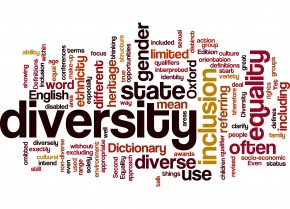 “Opposites attract” is an expression that has been popular for ages. I am sure we have all heard it in relation to romantic relationships, and reflected on whether the differences between people and the diversity in their personalities, interests, and backgrounds complement or challenge a relationship. A quick browse in the Internet reveals that there is support to both notions, with some arguing for the importance of similarities, and others seeing the benefits of diversity.
“Opposites attract” is an expression that has been popular for ages. I am sure we have all heard it in relation to romantic relationships, and reflected on whether the differences between people and the diversity in their personalities, interests, and backgrounds complement or challenge a relationship. A quick browse in the Internet reveals that there is support to both notions, with some arguing for the importance of similarities, and others seeing the benefits of diversity.
Be it as it may in terms of romantic relationships, at the societal level the latter notion seems to make intuitive sense, especially given the continuous movement of people across borders. Indeed, the official motto of the European Union says ‘United in Diversity’. As good as this may sound, the political turmoil of recent years is not supporting the idea well enough. Specifically, following the terrifying Charlie Hebdo attacks many publications (e.g. here, here and here) have pointed to increased immigration fears throughout Europe. An interesting On Point talk in Boston’s news station concludes that diverse Europe is currently on the edge, with years of immigration seemingly resulting in the desire for separation rather than integration. Needless to say, it is important to bring the EU’s motto to life ASAP.
Providing additional support for the benefits of diversity, the latest McKinsey research makes it clear that diversity matters, at least in purely business terms. Specifically, the research found that global companies in the top quartile for gender or racial and ethnic diversity are more likely to financially outperform their national industry medians. At the same time, companies with the least diversity are statistically also less likely to achieve above-average returns. Even though we have to be careful about the causality of the relationship, the McKinsey professionals conclude that companies with more diverse leadership teams are more successful due to many different reasons. For example, more diverse companies have more different cultural backgrounds, which can help in attracting top talent and understanding different customers across the globe. Moreover, as also suggested in one of my previous posts, cultural diversity may bring about more creativity, which is good for innovation, problem solving and decision making . Finally, the McKinsey research suggests that diversity may also increase returns through employee satisfaction. In a sense, who would not appreciate equal opportunities in a work place?
However, in spite of the different available data on the benefits of diversity for business performance, as always there are also associated challenges. As shown in an academic meta-analysis (Stahl et al., 2010) referred to in a previous post about diverse management teams, culturally diverse teams may experience process gains of increased creativity and satisfaction, but they also have process losses of increased conflict and lower social integration. To put it differently, globally diverse companies may have abundant opportunities to beneficially utilize this diversity, as long as they are capable of effectively managing the possible conflicts.
Maybe there is a learning point on a larger scale here? We do live in highly diverse societies, and we should continue looking at it as an opportunity . Yet, before collecting the benefits, the larger conflicts need to be carefully managed. And this is what we as individuals, citizens, professionals and policy makers should unite for.


i think the reason why diverse teams outperform less diverse teams is that when you hire expatriates you usually go for the persons with the most experience because of the labor laws that say when hiring a foreigner they should not be a local person who can do the job. so expatriates will tend to be over qualified and have tons of experience which results in better performance of the company.
https://speakwithageek.com recently did a study on blind auditions and hiring women in the workplace. They were also recently published in CNET and CBS for the study. I watched a few of their videos and found it very interesting. Thanks for sharing this valuable information on diversity and inclusion.
Just sharing but one of the biggest problems with companies looking to be diverse is that they do not invest enough time or money into training their staff in proper behaviors and truly creating diverse and inclusive environments. Personally training from The Canadian Diversity Initiative has helped us tremendously.
http://diversity.online-compliance.com/